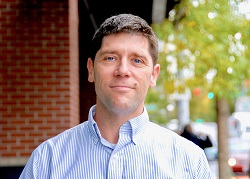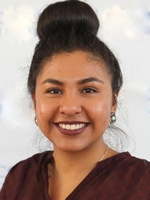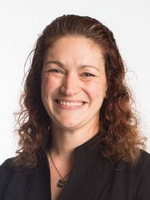These are bios for UW Health Services Ph.D. alumni who work in government. Contact us to learn more about how you can potentially connect with these alumni for advice, mentorship, or open positions at their organization.
Rosa Avila | Health Analytics and Vital Record, Alaska Department of Health
Deputy Chief of Health Analytics and Vital Record, Alaska Department of Health

During her doctoral studies, Avila pursued her Area of Emphasis in Evaluative Sciences and Statistics. She was an Agency for Healthcare Research and Quality (AHRQ) trainee for 2012-2014, and spent most of the 2013 and 2014 summers at AHRQ as a fellow in their Summer Intramural Fellowship. She completed her dissertation, “Reducing child health disparities with health policies: Is health reform enough?” working closely with Chair David Grembowski.
Prior to entering the doctoral program, Avila earned her MSPH from the University of South Florida, after earning a BA from Whitman College. She has worked at the National Center for Health Statistics, working on surveys related to child health.
In 2015, Avila was awarded a National Institutes of Health F31 Diversity Fellowship Grant for her project “Reducing Child Health Disparities with Health Policies: Is Health Reform Enough?” The goal of her study is to understand whether racial/ethnic health disparities among children can be reduced or eliminated with health policies to reduce uninsurance among children.
Avila’s research interests include linking health to employment, housing, or economic data to understand how they impact disparities in health care access, utilization, and health outcomes of our nation’s children.
Avila currently works as Deputy Chief of Health Analytics and Vital Record for Alaska’s Department of Health and Social Services/Division of Public Health.
Caleb Banta-Green | Alcohol and Drug Abuse Institute, University of Washington
Principal Research Scientist, Alcohol and Drug Abuse Institute, University of Washington

Caleb Banta-Green began his studies in the Health Services PhD program in 2005, and was an AHRQ T32 trainee while in the program. Banta-Green pursued an area of emphasis in Evaluation Sciences, and worked closely with Chuck Maynard to complete his dissertation, “Opioid drug abuse treatment: Factors associated with opioid use type and retention in treatment,” before graduating in 2008.
In 2012, Banta-Green worked as the Senior Science Adviser for the Executive Office of the President, on a very focused project on overdose prevention.
At present, Banta-Green works as a Principal Research Scientist at the University of Washington Addictions, Drug & Alcohol Institute and is an Affiliate Professor in the University of Washington Department of Health Systems and Population Health. He has a range of projects including clinical trials, implementation projects, building overdose surveillance capacity and technical assistance with local health departments.
Erica Chavez Santos | WA State Labor & Industries Work Equity Research Center
Occupational Health Epidemiologist, WA State Labor & Industries Work Equity Research Center

Erica Chavez Santos received her Bachelor of Science in Biology and Bachelor of Arts in Public health from the University of Washington in 2015. She served as an AmeriCorps Patient Navigator at Sea Mar Community Health Centers before completing her Masters in Public Health from Columbia University Mailman School of Public Health in 2018. Erica received her Doctor of Philosophy in Health Services in 2024, with an emphasis in Occupational Health Services Research. She worked with her chair, Barbara Baquero, and completed her dissertation, “Examining the association of labor laws on workplace safety and health indicators among Latinx agricultural workers.”
While in the doctoral program, she was on the National Institute for Occupational Safety and Health Training grant for the first three years. She received the UW Harry Bridges Center for Labor Studies Washington State Labor Research Grant in 2022 and the LERA-Bassett Scholarship in Labor Relations in 2019. Erica also participated in the American Evaluation Association Graduate Education Diversity Internship from 2020 to 2021, where she worked with the Center for Culturally Responsive Engagement at the Michigan Public Health Institute.
Erica is now an occupational health equity researcher at the WA State Labor & Industries Work Equity Research Center. She focuses equity-centered research to improve occupational safety and health for underserved workers in WA and has a strong passion for improving policies and protections, especially for workers of color and those that have historically been and are presently excluded or marginalized.
Susan Hernandez | Epidemiologist, Public Health – Seattle & King County
Epidemiologist, Public Health – Seattle & King County

Susan Hernandez earned her MPA in Health Policy and Management from New York University in 2008. During her doctoral studies at University of Washington, she worked closely with her Chair, Paul Hebert, to complete her dissertation “A First Look at the Patient-Centered Medical Home for Minority Veterans: Implementation and Utilization” before graduating in 2015.
During her doctoral studies, Hernandez was a trainee on the Agency for Healthcare Research and Quality (AHRQ) grant. She subsequently worked as a research assistant on two projects for Doug Conrad: 1. evaluating the success of state and regional payment-reform efforts; and 2. patient-centered care innovations. She then worked with Paul Hebert on the national evaluation of the Veterans Health Administration’s (VHA’s) Patient Aligned Care Teams. In 2013, Hernandez was an invited participant in TEDMED Live event held in Washington, D.C.
Hernandez was granted an Agency for Healthcare Research and Quality (AHRQ) R36 Dissertation Award for her project “A First Look at PCMH for Minority Veterans: Implementation and Utilization.” The goal of the was to test 1) whether implementation varied by the percent of minority veterans served at a VHA facility; and 2) whether the association between PACT implementation and changes in healthcare utilization differed across individuals of racial/ethnic minority groups.
After graduation, Hernandez continued her work at the VHA as a Postdoctoral Fellow in Health Services.
Hernandez is currently an Epidemiologist in the Assessment, Policy Development & Evaluation Unit at Public Health-Seattle & King County where she is part of the evaluation team for the Best Starts for Kids initiative. She is also an Affiliate Assistant Professor at the University of Washington in the School of Public Health. Hernandez has served on the Washington Health Benefit Exchange Health Equity Technical Advisory Committee since July 2019. She is also bilingual in Spanish and English.
Lauren Lipira | Data Analyst, Oregon Health Authority
Data Analyst, Oregon Health Authority

Lauren Lipira’s research interests include HIV stigma and other social and cultural factors that influence HIV prevention, treatment and outcomes; social determinants of health and intersectionality; immigrant health; and strategies for health promotion.
Lipira earned her MSW from Washington University in 2008.
During her doctoral training, Lipira pursued an AOE in Evaluative Sciences, and worked closely with her Chair, Emily Williams, on her dissertation, “Social and behavioral determinants of HIV care and outcomes among a sample of African-American women living with HIV.”
Lipira was an AHRQ NRSA T32 Health Services Research pre-doctoral trainee from 2014-2016, worked as an RA in the UW Department of Allergy and Infectious Disease from 2015-2016, and began an RA position at the Fred Hutchinson Cancer Research Center’s HIV Prevention Trials Network in Fall 2016.
Lipira earned her doctorate in 2018, and she currently works as a Data Analyst for the Oregon Health Authority.
Sara Tamers | Health Research Scientist, CDC
Health Research Scientist, U.S. Centers for Disease Control and Prevention (CDC)
Sara L. Tamers, PhD, MPH, began her studies in the Health Services PhD program in 2007, where she pursued an area of emphasis in Cancer Prevention and Control, while working closely with Shirley Beresford to complete her dissertation, “Understanding the Relationship between Worksite Social Support, Obesity, Health Care Utilization, and Worker Productivity,” before graduating in 2010.
Upon graduation, Tamers became a post-doctoral fellow at the Harvard School of Public Health and Dana-Farber Cancer Institute in Boston, MA. There, she continued her research on the impact of social and organizational factors on lifestyle risk factors.
Presently, Tamers is a Health Research Scientist and Coordinator for Research Program Development and Collaboration at the CDC’s National Institute for Occupational Safety and Health’s Office for Total Worker Health®.
Sarah Veele | Washington DCYF | University of Washington
Research and Analysis Administrator, Washington State Department of Children, Youth, and Families (DCYF)
Clinical Assistant Professor, Department of Health Systems and Population Health, University of Washington

After receiving her master’s degree in Epidemiology from the University of Michigan, Sarah Veele began her studies in the Health Services PhD program in 2005, and was an Occupational Health trainee while in the program. Veele pursued an area of emphasis in Occupational Health, and worked closely with Tom Wickizer and Clarence Spigner to complete her dissertation, “Intentional Injury in the Workplace: Identification and Prevention of Physical and Non-Physical Workplace Violence,” before graduating in 2010.
For 5 years after earning her PhD, Veele worked as a Senior Research Associate for the Washington Courts in the Washington State Center for Court Research (WSCCR). During her tenure with WSCCR, she focused on translating research to meet business practices of juvenile courts, assessing racial disparities in Washington’s juvenile justice system, and researching the issue of commercially sexually exploited children (CSEC) in Washington. Veele subsequently worked as a Research Manager in the Department of Social and Health Services: Juvenile Rehabilitation in Olympia where her research focused on the risks and needs of Washington State’s highest-risk youth who have been committed to Washington State for treatment and rehabilitation.
At present, Veele works as the Research and Analysis Administrator for the Washington State Department of Children, Youth, and Families, and as a Clinical Assistant Professor in the Department of Health Systems and Population Health at the University of Washington. Veele’s research interests include early childhood education, juvenile justice reform, evidence based programming, racial and ethnic disparities, unique programming needs of underrepresented populations, applied and translational research, and university, community, and governmental collaboration. Veele is a 2017 fellow in the Robert Wood Johnson Foundation’s Interdisciplinary Research Leaders Program.
